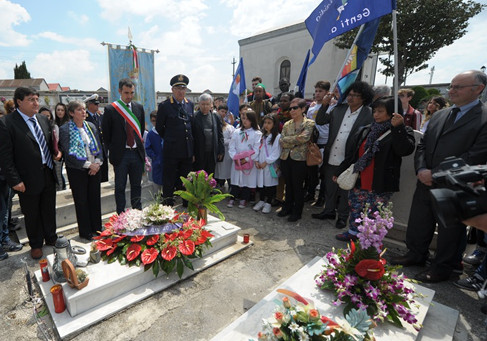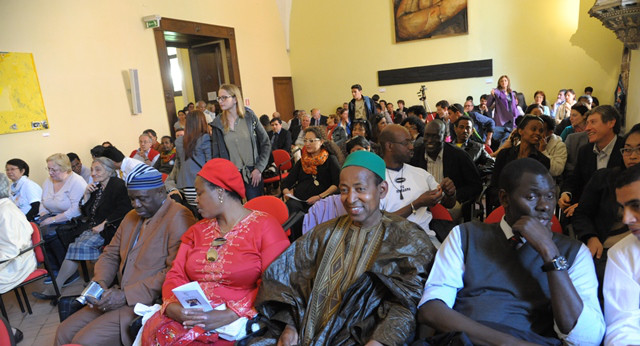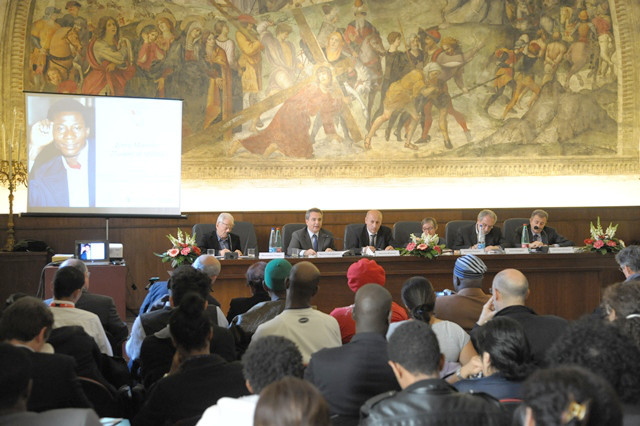 A touching memorial in Villa Literno, at the grave of Jerry Essan Masslo, a South African refugee and a guest in Italy of the Community of Sant'Egidio, killed on 24 August 1989, inaugurated the days of reflection on the theme of the "New Europeans" in Italy and Campania, organised by the Community of Sant'Egidio on 8 and 9 May. A touching memorial in Villa Literno, at the grave of Jerry Essan Masslo, a South African refugee and a guest in Italy of the Community of Sant'Egidio, killed on 24 August 1989, inaugurated the days of reflection on the theme of the "New Europeans" in Italy and Campania, organised by the Community of Sant'Egidio on 8 and 9 May.
There were many students of Villa Literno, Scampia and Naples along with numerous representatives of the People of Peace Movement of the Community of Sant'Egidio, from Naples, Rome and other Italian cities.
Europeans and new Europeans can live together
Daniela Pompei, in charge of the service to immigrants for Sant'Egidio, recalled how the death of Jerry Masslo marked a turning point in the history of immigration in Italy: living together between different peoples becomes an opportunity for development: "In these 25 years much has changed in Villa Literno and not only there, a new society has begun and must continue to grow. Europeans and new Europeans can live together".
"New Europeans in Italy and Campania" the two-day study meeting in Naples on the theme of migrants
Marco Impagliazzo, the president of the Community of Sant'Egidio, said that "it is not possible to live immigration as a threat. It is time to build a new common European home" "It is time to say thank you: to Jerry Masslo and to the many that work and help in our country, to the many new Italians and new Europeans; their presence indicates us a common future of peace and coexistence".
From the emergency humanitarian assistance to the construction of a new European home
Daniela Pompei, in retracing the story of Jerry Masslo, made it the key to understanding the history of immigration in Italy. His death was a turning point in the history of our country, something has changed in Italy during the past 25 years, from the abolition of the geographical clause for refugees on the Unique Text on Immigration to the operation "Mare Nostrum", thanks to which the Navy has saved thousands of lives from the Mediterranean. "Today - he concluded - there is need in Europe, as in 1989, of something that shakes the conscience, of a new culture, a legislative intelligence and a less afraid vision of Europe and the world, more open to the future because more open to the men and women that seek refuge and peace".
Prof. Salvatore Strozza, a demographer, retracing the history of the migration flows in our country, said that now we live in a multiethnic and multicultural society and from this we have to think about the future. Immigration is partly changed and today the issues of school placement and citizenship need to be addressed.
Gino Battaglia told the tragedies of the great journeys in the desert and the sea to come to Europe, pointing out in particular that, without the establishment of humanitarian corridors, the number of casualties in the sea will not decrease.
 Alessandro Triulzi, an expert and scholar on Africa, in face of the stories and tragedies of migration, reaffirmed the need to be scandalized, as pope Francis said. Immigration is a challenge we have to face in order to build a common future. Alessandro Triulzi, an expert and scholar on Africa, in face of the stories and tragedies of migration, reaffirmed the need to be scandalized, as pope Francis said. Immigration is a challenge we have to face in order to build a common future.
Cardinal Sepe, who spoke at the conference thanking the Community of Sant'Egidio for having organised a meeting of reflection so important, pointed out that this "plural society" that we talked about is a reality that belongs to us and in which we must learn to live. Jerry Masslo, like all those that have died chasing the dream of a better future, become witnesses that question conscience of everyone, even of those that have no conscience. His death made our society take a decisive step. "I hope that, from Jerry and all of them, we can learn to be more human considering ourselves brothers and sisters of a same human family".
Some proposals to Italy and Europe
In conclusion, Marco Impagliazzo submitted some proposals of the Community of Sant'Egidio to cope with the changed situation of immigration in Italy and in Europe, also in view of the European Semester of Italian Presidency:
• To maintain the operation "Mare Nostrum" by calling the European Union to support and strengthen it.
• A control room for an effective system of reception for asylum seekers and refugees through a central body to organise the reception all over the country and Europe.
• Establishment of European asylum and immigration offices in the transit countries, opening European offices for immigration in some countries on the southern shores of the Mediterranean to open a humanitarian channel for refugees.
• European solidarity in the new geography of asylum, as stipulated in Articles 67 and 80 of the Treaty on the Functioning of the Union that, in the field of immigration and asylum, speak of "the principle of solidarity and fair sharing of the responsibilities between Member States".To change the so-called "Dublin System". Solidarity all the more necessary in view of the fact that the refugees arrived in Italy in 2013 and in this first part of 2014, about 45% preferred to continue their journey to other European countries.
• Effective cooperation in achieving Euro-African integration. Cooperation with Africa, particularly in the countries of origin, is the most far-sighted response to the current humanitarian emergencies and to the refugee flows. | 
